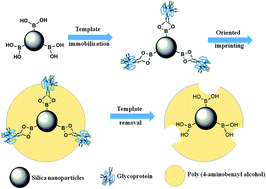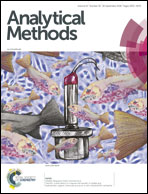Efficient preparation of template immobilization-based boronate affinity surface-imprinted silica nanoparticles using poly(4-aminobenzyl alcohol) as an imprinting coating for glycoprotein recognition†
Abstract
Many glycoproteins can be used as disease biomarkers for early clinical diagnostics and treatment of diseases. Selective enrichment is critical for the analysis of glycoproteins. Molecularly imprinted polymers (MIPs) have found important applications in the separation and enrichment of glycoproteins. However, template immobilization-based boronate affinity surface imprinting has not been used to prepare glycoprotein-imprinted silica nanoparticles using a new hydrophilic imprinting coating, poly(4-aminobenzyl alcohol). In this study, we use this imprinting strategy to prepare boronate affinity-based molecularly imprinted silica nanoparticles using poly(4-aminobenzyl alcohol) as an imprinting coating. After a glycoprotein template was covalently immobilized onto the surface of boronic acid functionalized silica nanoparticles, a thin imprinting coating of poly(4-aminobenzyl alcohol) was formed to cover the silica nanoparticle surface via in-water self-polymerization. After removing the template with an acidic solution, 3D cavities were formed in the imprinting layer. The imprinting coating was highly hydrophilic and presented limited residual boronic acid and therefore non-specific binding was avoided. The MIPs prepared under the optimal conditions exhibited several highly favorable features, including excellent specificity, a high binding strength of (0.71 ± 0.06) × 10−7 M and a low binding pH of 5.0. The MIPs prepared using this method were successfully applied in the determination of a TRF concentration of 2.75 ± 0.25 mg mL−1 in human serum.



 Please wait while we load your content...
Please wait while we load your content...